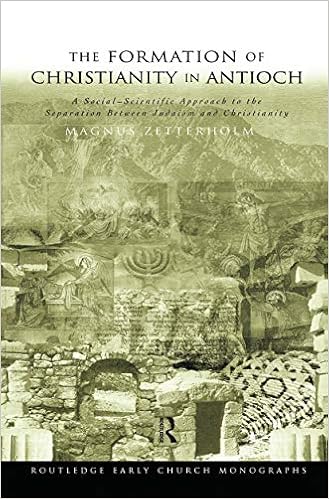A really good intellectual work will often pull one toward a new way of thinking, slowly and then all of a sudden, providing an epiphany similar to what a character might receive at the end of a work of fiction. Zetterholm's book is such a work. Perhaps not quite as much of a history of Christian church in Antioch as I would have liked, it managed to make me rethink a bit what's going on in Ignatius's letters and why the Gentile church would have an interest in a gospel mostly aimed at Jewish concerns.
Zetterholm's basic thesis is that the parting of the ways of Christians from Jews was not so much that as it was a separating of Jesus-believing Jews from Jesus-believing Gentiles. This may seem obvious, but Zetterholm focuses on what the implications for such a statement really mean.
The book begins by looking at the role of the Jewish community in Antioch. As Zetterholm makes plain, that community was not a unified front. As with any immigrant community, Jewish peoples in Antioch fell into various factions. Here, Zetterholm uses social theory to make his point. (The long summaries of such theory are perhaps what makes the work very much one of scholarly tone and less interesting than it would otherwise be.) That theory essentially posits that such immigrant communities have varying sets of people: some aim to fit in more with the community to which they've moved, some become more inclined to focus even more on preserving the culture from which they have come. And then, there are folks of various stripes in between, who merge some aspects of the old home with that of the new. So some Jewish people gave up practicing “Judaism,” while others became much more devout, and still others continued some practices while abandoning and adopting others. Judaism, at this time, Zetterholm claims, although not the definitive religion we now know it to be still had unique characteristics that all the various sects would have agreed on, even if they didn't agree on all the particulars or the meaning of those characteristics.
Gentiles in Antioch would have been attracted to Jewish synagogues because of the community that such gatherings offered. Antioch as a city would have been a dangerous and lonely place full of crime and disease. The Jewish synagogue would have offered a reprieve from such a world in ways few others legal gatherings could have. The Jesus movement's impact within those synagogues would mean that some of the synagogues more open to Gentiles would have been affiliated with the faith being forged at that time.
Much ink is spilled at this point on the Acts 15 conference and Paul's letter to the Galatians, as it is in any work about Antioch. Zetterholm, like many, if not most, Christian writers posits a split between followers of James and Paul that would be relatively permanent, with Paul demandings Gentiles remain Gentiles and James demanding Gentiles become Jewish. (The disputes in the New Testament, I would counter, don't really show this.) Nevertheless, the implications of the differing factions do play out in an intriguing way as Zetterholm sees it.
The reason is that after the destruction of the temple and the imposition of the tax on all Jewish people, Gentile believers would have been placed in an awkward position. All Jews, whether practicing or not, were subject to the tax. Gentiles, by contrast, would have only been subject to the tax if they became Jews. As such, they'd have had strong reasons not to become Jewish. Within the synagogue, however, in some communities, they could not take part unless they became “Jewish” by taking on Jewish customs. If the opted not to become Jewish, as Paul had told them they should not be, then the couldn't be full-fledged members of the synagogue and, as such, couldn't be part of a legally recognized colegium. So either they had to become fully Jews (and pay the tax) or they couldn't meet with the synagogue and thus were subject to punishment for illegal gatherings—a penalty either way. Efforts to justify Christianity to Roman authorities (as per the second-century apologists), in his reading, thus become efforts to become legally recognized gatherings separate from Jewish gatherings. As such, criticism of the Jewish faith within such writings are part of an effort to help those Roman authorities distinguish the two from one another, but with the Gentiles now claiming to better represent the ancient faith written out in the Jewish scriptures. Thus, they are still a synagogue group of sorts, in the ancientness of their beliefs, but not of the Jewish stamp, in the rebelliousness of their subjects. When Roman authorities finally do recognize the different several centuries later, anti-semitism has become part of parcel of early Christian teaching.







No comments:
Post a Comment